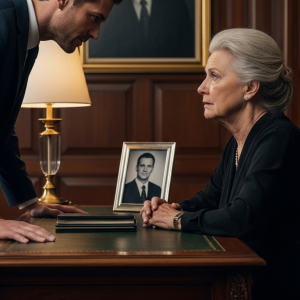The reading of a will is often the final chapter of one person’s story, but for the Davenport family, it was the explosive prologue to a new and dangerous one. When industrialist Robert Davenport passed away, he left the keys to his multi-million-dollar manufacturing empire, Davenport Industries, not to his son, Mark, but to his daughter, Anna. Anna was sharp, innovative, and had a mind for business that mirrored her father’s. She also had a severe, life-threatening allergy to peanuts.
The decision created a fracture in the family that was immediate and deep. While Mark, a passive and gentle man, accepted his father’s wishes with a quiet disappointment, his wife, Brenda, did not. Brenda was a woman who wore a smile like a mask and whose ambition for her husband burned with a cold, resentful fire. She saw the inheritance not as a testament to Anna’s skill, but as a personal insult, a theft of what she believed was rightfully her husband’s.
The tension became a toxic, unspoken guest at every family gathering. Brenda’s bitterness often bled through her perfectly composed facade in the form of sharp, smiling barbs. At a dinner a few months after the will was read, she had raised a glass of wine in a toast to Anna’s recent success in securing a new contract.
“To Anna,” Brenda had said, her voice dripping with a saccharine sweetness that didn’t reach her eyes. “So capable and so… resilient. It’s such a shame she has that dreadful allergy. We all just have to pray she remains in perfect health. After all, if anything were to happen to her, I suppose my Mark would finally have to step up and take his rightful place at the head of the company.”
The comment hung in the air, a threat veiled as a toast. Anna had felt a chill run down her spine. Mark had looked deeply uncomfortable, muttering his wife’s name in a weak reprimand. But Anna knew Brenda’s words were not a joke; they were a desire, spoken aloud.
Anna’s allergy was a constant, carefully managed shadow over her life. Anaphylactic shock was a swift and brutal enemy. She carried two EpiPens at all times, read every food label with the diligence of a bomb disposal expert, and trusted very few people with her food. The irony was cruel: she could navigate a hostile corporate boardroom with ease, but a single, hidden peanut could kill her.
Her closest friend, Chloe, a Cordon Bleu-trained chef who had been her college roommate, was her most trusted ally. “You can’t let your guard down with her, Anna,” Chloe had warned after the dinner. “That woman looks at you like you’re a problem she’s trying to solve.” Anna had brushed it off as an exaggeration, wanting to believe that even Brenda’s jealousy had its limits. It was a mistake she would nearly pay for with her life.
The 50th-anniversary gala for Davenport Industries was meant to be a celebration of legacy. Held in a lavishly decorated ballroom, it was a testament to the empire Anna’s parents had built. Anna, as the new CEO, gave a speech that was both a tribute to the past and a bold vision for the future. She felt the weight of her father’s legacy on her shoulders, but it was a weight she was proud to carry.
Brenda moved through the party with a practiced, sociable grace, but her eyes followed Anna’s every move. She had insisted on personally overseeing a part of the catering, claiming she wanted to contribute something “personal” to the event. Her special project was a custom-made appetizer for the head table: a gourmet chicken satay.
She approached Anna with two plates in hand. One was from the main buffet. The other, a smaller, more elegant plate, she held out with a brilliant smile. “I made this one just for you, Anna,” she said, her voice a conspiratorial whisper. “I know how worried you get at these things, so I made a completely separate batch of the satay sauce in a sanitized part of the kitchen. Absolutely no peanuts, I promise.”
Anna hesitated. Her internal alarm bells, honed by a lifetime of vigilance, were screaming. But she was standing in front of the company’s board members and most important clients. To refuse would cause a scene, reinforcing the narrative Brenda was so keen to spin: that Anna was difficult, paranoid, and fragile.
“You’re sure?” Anna asked, her voice low. “Brenda, you know I can’t take any risks.”
“Of course, silly!” Brenda laughed, a light, tinkling sound. “I was so careful. I wouldn’t dream of putting you in harm’s way. I made it with a base of sunflower seed butter and used only pure olive oil. I made it myself, just for my sister.” The word “sister” was a poisoned dart, fired with a perfect smile.
Trapped, and not wanting to undermine her own authority with a public display of fear, Anna made a fatal miscalculation. She took the plate. “Thank you, Brenda. That’s very thoughtful.” She took a single, small bite of the chicken. The sauce was rich and savory. For a moment, she thought she had been wrong to be suspicious.
Then, the fire started. It began as an itch on her tongue, then a metallic taste in her mouth. Within a minute, a tightness gripped her chest, as if a steel band were being cranked around her lungs. She looked up, her eyes wide with panic, and met Brenda’s gaze across the table. Brenda was watching her, a flicker of cold, clinical observation in her eyes. And in that moment, Anna knew. This was no accident.
She tried to speak, to call for help, but her airway was closing. Her hand went to her throat as a wheezing sound escaped her lips. She fumbled for the purse containing her EpiPen, but her limbs were growing heavy, her vision tunneling. The world dissolved into a chaos of shouting voices and terrified faces as she slid from her chair and collapsed onto the floor.
The world came back to Anna in fragments of sterile white and the rhythmic beeping of machines. She was in the ICU, an oxygen mask over her face, the blessed relief of air filling her lungs. A doctor explained how close she had come. The paramedics had administered her EpiPen just in time, restarting her heart in the ambulance. She had survived, but only by the slimmest of margins.
While Anna was fighting for her life, her friend Chloe was moving with a cold, clear purpose back at the chaotic party. As a chef, she understood the anatomy of a dish. She knew that Brenda’s story about sunflower seed butter was plausible, but she also knew the look she had seen in Brenda’s eyes. While paramedics swarmed Anna and the guests were in a state of panicked confusion, Chloe walked calmly to the head table.
With the subtle, practiced movements of a professional, she took a clean napkin, scooped up the remaining chicken satay from Anna’s plate, and folded it carefully. She then went to the main buffet and took a sample of the regular satay. She placed both samples in separate plastic bags from her purse, labeling them with a pen. It was an act of pure, instinctual suspicion, a chef’s distrust of a dish that had gone horribly wrong.
The next day, while Anna was recovering in the hospital, Chloe visited. She didn’t bring flowers; she brought a mission. “I sent the samples to a private lab I use for my restaurant,” Chloe said, her voice low and furious. “The one from your plate. We’ll have the results in twenty-four hours. I know what they’re going to find, Anna. She tried to kill you.”
The confirmation arrived the following afternoon via a secure email to Anna’s phone. She opened the attached PDF, her heart pounding against her ribs. The lab report was stark and unequivocal. The sample from the main buffet showed trace amounts of peanut, likely from cross-contamination. But the sample from her plate, the “special” dish Brenda had made, was different.
The report read: “Quantitative Analysis reveals a high concentration of refined peanut oil, deliberately integrated into the sauce base.”
Anna stared at the words, her breath catching in her throat. It wasn’t an accident. It wasn’t negligence. It was a weapon, delivered with a smile. The memory of Brenda’s chilling “joke” echoed in her mind. This was a calculated execution attempt, disguised as an appetizer.
A new strength, forged in the fires of betrayal and near-death, flooded her veins. The fear was gone, replaced by an icy, unshakeable resolve. She picked up her phone. Her first call was to her family’s corporate lawyer to get a copy of the survivorship clause in her father’s will. Her second call was to the police.
Two days later, Anna was discharged from the hospital. She was weak, bruised from the CPR, but her eyes held a new, hard light. She learned that Brenda had told the family that the party had been “ruined” by Anna’s “dramatic overreaction” to a minor contamination incident. She was painting herself as the victim, the caring sister-in-law whose thoughtful gesture had been met with hysteria.
The family and key business partners had been called to a formal debriefing at the Davenport estate, ostensibly to manage the “PR crisis” from the gala. Brenda was holding court in the living room, dabbing at her dry eyes with a handkerchief, telling everyone how worried she had been.
“I just feel so awful,” Brenda said to a sympathetic board member. “I took every precaution. I suppose some people are just… terribly sensitive. I’m just praying she forgives me for the scare.”
It was at that moment that the grand double doors of the living room swung open.
Anna stood on the threshold. She was still pale, wearing simple clothes that hung loosely on her frame, but she stood with the posture of a queen. The room fell into a stunned silence. Behind her, flanking the doorway, stood two uniformed police detectives.
Brenda’s performance faltered, her jaw dropping slightly. “Anna! Oh, thank goodness, you’re alright! I was so worried!” she stammered, rushing forward.
Anna held up a hand, stopping her cold. Her voice, though quiet, cut through the room with absolute authority. “Save the performance, Brenda. I heard all about your ‘special’ dish.” She took a slow step into the room, her eyes never leaving her sister-in-law’s face.
“It was a delicious sauce,” Anna continued, her voice dangerously calm. “So unique. So memorable. So I had it tested.”
The color drained from Brenda’s face. Her husband, Mark, looked on in confusion. “Tested? Anna, what is this? Mom and Dad are worried sick, Brenda feels terrible…”
“She feels terrible that she failed,” Anna snapped, her gaze now a steel trap on Brenda. At that moment, one of the detectives stepped forward, a folded document in his hand.
“This is a copy of Robert and Elizabeth Davenport’s will,” the detective announced to the room. “It contains a survivorship clause. In the event of Anna Davenport’s death, sole control of Davenport Industries would transfer to her brother, Mark Miller.” He then looked directly at Brenda.
The second detective stepped up beside him, his hands holding a pair of handcuffs. His voice boomed in the silent room, a formal, damning pronouncement.
“Brenda Miller, you are under arrest for the attempted murder of Anna Davenport in the first degree.”
The click of the handcuffs locking around Brenda’s wrists was a sound that shattered the world. Brenda erupted, her mask of civility disintegrating into a rictus of raw panic. “No! This is insane! She’s lying! I would never!” she shrieked, struggling against the detective’s grip.
“The lab results are not lying, ma’am,” the lead detective said calmly. “Nor is the digital trail of your online searches for ‘odorless peanut oil’ and ‘lethal dose anaphylaxis’.”
The destruction of Brenda was total and public. She was being arrested in the heart of the home she had so desperately wanted to control, in front of the very people she had tried to impress with her social grace. The business partners and board members looked on in horror, their faces a mixture of shock and disgust.
But the greatest devastation was etched on the face of her husband. Mark stared, his expression slack with disbelief, as the woman he loved, the woman he had defended, was revealed to be a cold-blooded monster. He looked from his screaming, struggling wife to his sister, who stood, pale and resolute, a survivor.
“Mark…” Brenda wailed as she was led away, “Tell them! Tell them it’s a mistake! I did it for you! For us!”
Her final words, meant to be a plea for loyalty, were instead the final, damning confirmation of her motive. Mark sank to his knees, a guttural sob escaping his lips. It wasn’t just his wife who was being taken away; it was his entire reality, his trust, the very foundation of his life, all of it exposed as a monstrous lie. The empire she had tried to kill for was now ashes in his mouth.
In the weeks that followed, the story of the “Deadly Dish” became a notorious piece of corporate lore. Brenda, faced with irrefutable evidence, accepted a plea bargain that would keep her in prison for decades. The scandal could have destroyed Davenport Industries, but Anna, demonstrating a strength her father would have admired, steered the company through the storm with transparency and unwavering leadership.
Mark was a broken man. He immediately filed for divorce and publicly disavowed his wife’s actions. The shock had been a brutal awakening, forcing him to see the poison he had allowed to fester in his family for years. Humbled and ashamed, he went to his sister’s office, ready to offer his resignation and disappear.
Anna, however, saw not a co-conspirator, but another victim of Brenda’s manipulation. She didn’t offer him pity, but she did offer him a chance. “She preyed on your insecurities, Mark. She used your love as a weapon. That’s not your fault. But what you do now… that is.”
The healing was not easy. It was a slow, painful process of rebuilding a trust that had been shattered. Mark started from the bottom, taking a managerial role in one of the company’s divisions, determined to earn his place through merit, not birthright. He worked tirelessly, his quiet dedication a constant, unspoken apology to his sister.
Months later, on the 51st anniversary of the company’s founding, Anna and Mark stood together in the CEO’s office. The office was bathed in the warm light of the setting sun. On the wall hung the portrait of their parents, smiling and vibrant.
“Dad was right,” Mark said quietly, his eyes on the portrait. “You were always the one meant to lead this. I just… I was too blind to see it.”
“He wanted us to do it together,” Anna replied, her voice soft but firm. She put a hand on his shoulder. “And we will. We’ll make them proud.”
Anna had survived the unthinkable. She had not only protected her life and her parents’ legacy, but she had been given a second chance to save her family from the poison that had nearly destroyed them all. The wound would always be there, a scar to remind them of the cost of greed and jealousy, but for the first time in a long time, the future of the Davenport family felt bright.




